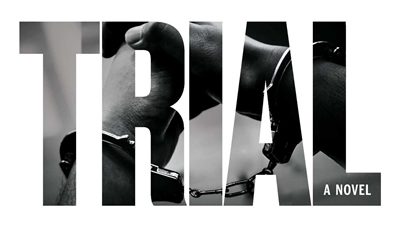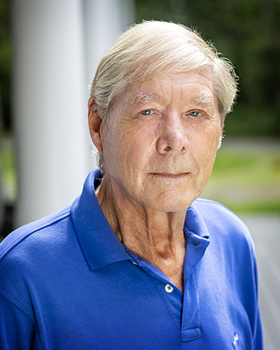

Features On the Cover: Richard North Patterson
Richard North Patterson’s New Novel, TRIAL,
Being Compared With To Kill a Mockingbird
 By Rick Pullen
By Rick Pullen
If this were 1960, Richard North Patterson’s gripping suspense novel, TRIAL, might have been called TO KILL A MOCKINGBIRD. His first novel in nine years has been compared to Harper Lee’s classic and rightfully so. But this is 2023 and he has updated the story of racial prejudice focusing on how much has not changed in America since Lee’s breakout novel 63 years ago.
TRIAL is a sensitive and intelligent account of racism, Black voter suppression, and an inter-racial love affair in America set in 2022. It will land on store bookshelves June 13.
This tale of America’s original sin is played out through the entitled passion of a very rich and idealistic Massachusetts congressman who comes to understand even his privilege makes little difference when it comes to race. Patterson’s story shows us we are still fighting the same issues—many nuanced and layered by the decades—but still barely coagulating at the surface.
The story begins with the lust of the oh-so-very Boston-bred and white-privilege-sounding Chase Bancroft Brevard, an obvious choice for Harvard inbreeding. By contrast, Allie Hill is a young Black woman who found her place in the middle-class because her family runs a Black funeral home in rural Georgia.
Approaching graduation at Harvard, Allie and Chase fall in love and struggle with the social differences between their upbringings. Their relationship grapples with not just two cultures colliding, but two entirely separate worlds. Patterson’s sensitive description of their relationship runs deep, and it alone is worth this thriller’s hardcover price of admission.
He explores class and race honestly. It’s disturbing to read and still we’re eager to know if two young college students can find common ground beyond the bedroom. When Allie abruptly leaves without a word at graduation time, they both return to their roots and ambitions—he to Boston and she to rural Georgia. He becomes a progressive lawyer and later the same breed of congressman. (What else is there in Massachusetts?) She takes up the cudgel of a Black voter registration organization to stop Georgia’s voter suppression efforts and becomes the state’s premier voting rights advocate.
They lose track of each other until one morning when Chase, a rising star in the Democratic Party, sees the woman who broke his heart on a cable news channel. He is shocked to learn she’s a single mother, and her only son has just been arrested and accused of murdering a white sheriff’s deputy. Chase quickly does the math and realizes the young high school senior is his.
Then the real trial begins as Patterson explores the relationships between a Black woman and a white man—and their biracial son as they become a media sensation. Chase risks his political career going to Georgia to help his son only to realize how difficult that is—not only as a legal matter, but to be accepted as a father who’s missed out on his son’s entire existence.
Only then does the circus begin.
Their son’s murder trial attracts knuckle-dragging white supremacists protesting outside the courthouse. Patterson’s description is blunt and walks up to the edge of cartoonish. And yet, his writing captures that very truth, that white supremacists are cartoonish. Their exaggerated and incendiary spewing of intolerance, superiority, and hate is comical but never benign.
“Too many white people are all tangled up about race—they’re angry about feeling subliminal guilt without knowing enough about our history to understand why,” says protagonist Chase. “Instead, they feel resentful and, in an odd way, victimized. A classic case of projection.”
The underlying subtlety of today’s racism versus the sensational chanting of white supremacists displays the racial flashpoint in Patterson’s story. It’s easier for the frothing news media at the trial to tell the story of hate-spewing racists with guns and camouflage, than it is to assimilate the vital nuances of America’s racial divide into a cohesive relatable story. Journalism has its limits, but Patterson’s fiction does not.
The underlying subtlety of today’s racism versus the sensational chanting of white supremacists displays the racial flashpoint in Patterson’s story.Perhaps the novel’s most important element is Patterson’s examination of the turmoil of falling in love with someone of a different race in a country where many still refused to accept those relationships and are fearful to acknowledge we are not all of one genre. His writing is precise as he examines in detail their feelings for each other. Rarely, do you find a legal thriller with this degree of literary depth.
He then steps beyond their relationship and examines today’s Black and white environment—two separate American cultures that do not live in harmony but side-by-side like two roommates who tolerate each other because neither can afford the apartment without the other. Patterson captures it in its full ugliness while never slowing the pace of his engrossing story.
How did he manage this? He spent a lot of time vigorously researching his topic. Patterson, whose 25 million copies of 22 novels—16 of which were drowned in NYT bestseller lust—spent the last decade writing political commentary for HuffPost, The Bulwark, and The Boston Globe. He realized much of his writings dealt with race, so he decided to use the creative reserves of fiction to delve more intensely into racism and capture its intrinsic truths.
“To depict my fictional Cade County, I spent an extended period in Sumter County, Georgia, a jurisdiction with a complicated past and present marked by often bitter political and social divisions,” Patterson says. Sumter is near Americus, Georgia, near former President Jimmy Carter’s home. There, Patterson interviewed grassroots voting rights activists, community leaders, ministers, civil rights lawyers, Black and white politicians, judges, the first Black sheriff, and a woman who, in 1960 at age 11, was imprisoned with other adolescent girls who tried to integrate a movie theater—an event known as the Leesburg Incident. Patterson includes it in his stunning narrative.
While in Sumter County he toured both Black and white cemeteries. The white cemetery was well-groomed and filled with Confederate statues. The Black cemetery was not nearly as pristine. Patterson noticed rows of infant graves there and was told infant mortality in rural Georgie is much higher among Blacks than whites—the result of their lack of access to good healthcare.
“You just see it all. It’s just not subtle,” he says.
To portray Allie Hill accurately, Patterson interviewed Nse Ufot, successor to Stacey Abrams as the head of the state’s seminal voting rights organization, the New Georgia Project, and three Black women who attended Harvard in 2003.
Patterson says 19 New York imprints declined to publish TRIAL. But Post Hill Press Executive Editor Adam Bellow didn’t hesitate. A small conservative and Christian publisher based outside of Nashville, has taken on many controversial books during its history. Bellow, a 30-year veteran of New York publishing and son of acclaimed bestselling novelist Saul Bellow, saw a huge business opportunity.
TRIAL has bestseller written all over it.
“This is a portrait of the America I know,” says Bruce Gordon, former CEO of the NAACP. “It is compelling, contemporary, and thoughtfully researched truth telling. TRIAL might be fictional, but it is real.”
Harper Lee proved this axiom 63 years ago. Richard North Patterson may be about to do the same in this century.
Rick Pullen is the bestselling author of Naked Ambition, Naked Truth, and The Apprentice. He authors “Idol Talk,” a newsletter of gossip and insider stories about your favorite mystery, crime, and thriller authors. Learn more at RickPullen.com.
- On the Cover: Richard North Patterson - May 31, 2023
- On the Cover: Robert Dugoni - March 31, 2023
- Up Close: Tammy Euliano - December 30, 2022

